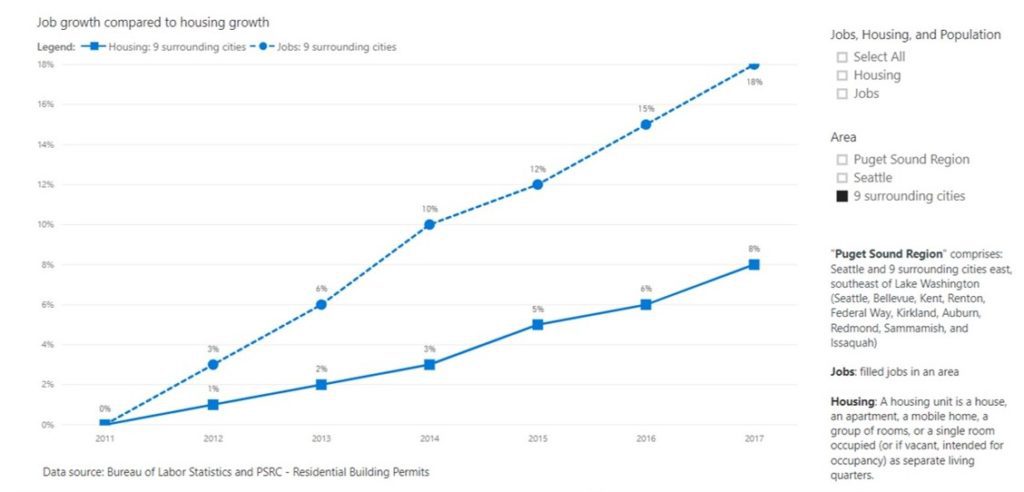Microsoft announced Wednesday a plan to invest $500 million in affordable housing solutions for Seattle and the Puget Sound area in Washington, to alleviate the stress that the growth in local, high-paying tech employment is putting on the housing market.
The tech giant, headquartered in nearby Redmond, Washington, plans to help fund low- and market-rate loans and grants to local groups and initiatives, as outlined by Microsoft President Brad Smith and Chief Financial Officer Amy Hood in an open letter.
Fueled by companies including Microsoft, Amazon, Redfin, and other tech employers, jobs in the Puget Sound region have grown 21 percent while growth in housing construction has risen at a 13 percent clip since 2011, according to Microsoft’s research. As a result of that gap, housing prices have jumped 96 percent in the past eight years.
“Median income in the region hasn’t kept pace with rising housing costs, increasingly making it impossible for lower- and middle-income workers to afford to live close to where they work,” the letter reads. “Teachers, nurses, first responders and many in key roles at nonprofits, businesses and tech companies now begin and end their workdays with long commutes. And people who are homeless face problems that are even more daunting.”

(Credit: Microsoft)
Through the new initiative, Microsoft is setting aside $225 million in lower-than-market rate loans to inject capital and subsidize the preservation and construction of middle-income housing in Bellevue, Kirkland, Redmond, Issaquah, Renton and Sammamish.
 How you know you’ve found a winning team
A top producer shares what she looked for — and found — in her brokerage READ MORE
How you know you’ve found a winning team
A top producer shares what she looked for — and found — in her brokerage READ MORE
Additionally, the company will provide $250 million in loans at market rate returns to support the building of low-income housing across King County.
The final $25 million will go towards philanthropic grants to addresses homeless in the Seattle region, including $5 million to the Home Base program created by the Seattle Mariners, the United Way and King County Bar Association and $5 million to support a joint agency on homelessness being formed by the city and county.

Sam DeBord
Sam DeBord, the managing broker at Coldwell Banker Danforth in the Puget Sound region, said Microsoft’s efforts are appreciated and much needed. They fall in line with a growing coalition of businesses and non-profits pushing the Unlock the Door campaign, which is seeking a more favorable to build affordable homes.
“Supply and demand don’t lie,” DeBord said. “It’s too expensive for most developers to build anything but luxury homes in the greater Seattle region. So we’re looking for sensible streamlining of regulations and reducing financial and bureaucratic hurdles that keep developers from building more homes here.”
DeBord echoed Microsoft’s findings that job growth in Western Washington has led to rising home prices and a lack of new housing supply.
“Growing cities need dense housing in the employment cores near transit centers,” DeBord said. “A coalition of technology, real estate, non-profit, and legislative groups can help make that happen, and Microsoft is a fantastic leader in the mission to unlock the door to housing opportunities in our region.”
In a statement, Racquel Russell, Zillow’s vice president of government relations and public affairs, praised Microsoft’s announcement.
“Working to solve homelessness and housing insecurity is near and dear to our hearts at Zillow Group and it’s fantastic to see Microsoft taking such significant action for our community,” Russell said. “Over the past several months, we worked with Microsoft to provide their teams with access to housing data for the Seattle area as they work to address these issues facing the region our companies share.”
The move comes at a time when tech company’s are increasingly seeing pushback on their impact from local communities.
A number of elected officials, locals and community advocates in New York have objected the potential presence of Amazon in Long Island City, expressing concern that it could make the Queens neighborhood more unaffordable and lead to further gentrification.
Source: click here














